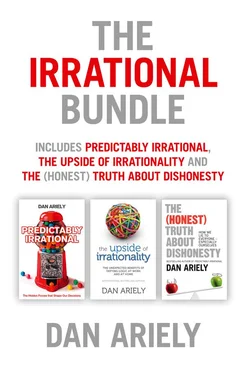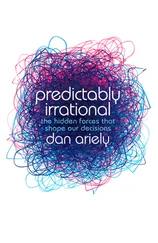Dan Ariely - The Irrational Bundle
Здесь есть возможность читать онлайн «Dan Ariely - The Irrational Bundle» — ознакомительный отрывок электронной книги совершенно бесплатно, а после прочтения отрывка купить полную версию. В некоторых случаях можно слушать аудио, скачать через торрент в формате fb2 и присутствует краткое содержание. Жанр: unrecognised, на английском языке. Описание произведения, (предисловие) а так же отзывы посетителей доступны на портале библиотеки ЛибКат.
- Название:The Irrational Bundle
- Автор:
- Жанр:
- Год:неизвестен
- ISBN:нет данных
- Рейтинг книги:3 / 5. Голосов: 1
-
Избранное:Добавить в избранное
- Отзывы:
-
Ваша оценка:
- 60
- 1
- 2
- 3
- 4
- 5
The Irrational Bundle: краткое содержание, описание и аннотация
Предлагаем к чтению аннотацию, описание, краткое содержание или предисловие (зависит от того, что написал сам автор книги «The Irrational Bundle»). Если вы не нашли необходимую информацию о книге — напишите в комментариях, мы постараемся отыскать её.
The Irrational Bundle — читать онлайн ознакомительный отрывок
Ниже представлен текст книги, разбитый по страницам. Система сохранения места последней прочитанной страницы, позволяет с удобством читать онлайн бесплатно книгу «The Irrational Bundle», без необходимости каждый раз заново искать на чём Вы остановились. Поставьте закладку, и сможете в любой момент перейти на страницу, на которой закончили чтение.
Интервал:
Закладка:
One day, to the surprise of my students, I opened the day’s lecture on managerial psychology with a poetry selection, a few lines of “Whoever you are holding me now in hand” from Walt Whitman’s Leaves of Grass:
Whoever you are holding me now in hand,
Without one thing all will be useless,
I give you fair warning before you attempt me further,
I am not what you supposed, but far different.
Who is he that would become my follower?
Who would sign himself a candidate for my affections?
The way is suspicious, the result uncertain, perhaps destructive,
You would have to give up all else, I alone would expect to be your sole and exclusive standard,
Your novitiate would even then be long and exhausting,
The whole past theory of your life and all conformity to the lives around you would have to be abandon’d,
Therefore release me now before troubling yourself any further, let go your hand from my shoulders,
Put me down and depart on your way.
After closing the book, I told the students that I would be conducting three readings from Walt Whitman’s Leaves of Grass that Friday evening: one short, one medium, and one long. Owing to limited space, I told them, I had decided to hold an auction to determine who could attend. I passed out sheets of paper so that they could bid for a space; but before they did so, I had a question to ask them.
I asked half the students to write down whether, hypothetically, they would be willing to pay me $10 for a 10-minute poetry recitation. I asked the other half to write down whether, hypothetically, they would be willing to listen to me recite poetry for ten minutes if I paid them $10.
This, of course, served as the anchor. Now I asked the students to bid for a spot at my poetry reading. Do you think the initial anchor influenced the ensuing bids?
Before I tell you, consider two things. First, my skills at reading poetry are not of the first order. So asking someone to pay me for 10 minutes of it could be considered a stretch. Second, even though I asked half of the students if they would pay me for the privilege of attending the recitation, they didn’t have to bid that way. They could have turned the tables completely and demanded that I pay them.
And now to the results (drumroll, please). Those who answered the hypothetical question about paying me were indeed willing to pay me for the privilege. They offered, on average, to pay me about a dollar for the short poetry reading, about two dollars for the medium poetry reading, and a bit more than three dollars for the long poetry reading. (Maybe I could make a living outside academe after all.)
But, what about those who were anchored to the thought of being paid (rather than paying me)? As you might expect, they demanded payment: on average, they wanted $1.30 to listen to the short poetry reading, $2.70 to listen to the medium poetry reading, and $4.80 to endure the long poetry reading.
Much like Tom Sawyer, then, I was able to take an ambiguous experience (and if you could hear me recite poetry, you would understand just how ambiguous this experience is) and arbitrarily make it into a pleasurable or painful experience. Neither group of students knew whether my poetry reading was of the quality that is worth paying for or of the quality that is worth listening to only if one is being financially compensated for the experience (they did not know if it is pleasurable or painful). But once the first impression had been formed (that they would pay me or that I would pay them), the die was cast and the anchor set. Moreover, once the first decision had been made, other decisions followed in what seemed to be a logical and coherent manner. The students did not know whether listening to me recite poetry was a good or bad experience, but whatever their first decision was, they used it as input for their subsequent decisions and provided a coherent pattern of responses across the three poetry readings.
Of course, Mark Twain came to the same conclusions: “If Tom had been a great and wise philosopher, like the writer of this book, he would now have comprehended that work consists of whatever a body is obliged to do, and that play consists of whatever a body is not obliged to do.” Mark Twain further observed: “There are wealthy gentlemen in England who drive four-horse passenger-coaches twenty or thirty miles on a daily line in the summer because the privilege costs them considerable money; but if they were offered wages for the service, that would turn it into work, and then they would resign.” * Конец ознакомительного фрагмента. Текст предоставлен ООО «ЛитРес». Прочитайте эту книгу целиком, купив полную легальную версию на ЛитРес. Безопасно оплатить книгу можно банковской картой Visa, MasterCard, Maestro, со счета мобильного телефона, с платежного терминала, в салоне МТС или Связной, через PayPal, WebMoney, Яндекс.Деньги, QIWI Кошелек, бонусными картами или другим удобным Вам способом.
WHERE DO THESE thoughts lead us? For one, they illustrate the many choices we make, from the trivial to the profound, in which anchoring plays a role. We decide whether or not to purchase Big Macs, smoke, run red lights, take vacations in Patagonia, listen to Tchaikovsky, slave away at doctoral dissertations, marry, have children, live in the suburbs, vote Republican, and so on. According to economic theory, we base these decisions on our fundamental values—our likes and dislikes.
But what are the main lessons from these experiments about our lives in general? Could it be that the lives we have so carefully crafted are largely just a product of arbitrary coherence? Could it be that we made arbitrary decisions at some point in the past (like the goslings that adopted Lorenz as their parent) and have built our lives on them ever since, assuming that the original decisions were wise? Is that how we chose our careers, our spouses, the clothes we wear, and the way we style our hair? Were they smart decisions in the first place? Or were they partially random first imprints that have run wild?
Descartes said, Cogito ergo sum—“I think, therefore I am.” But suppose we are nothing more than the sum of our first, naive, random behaviors. What then?
These questions may be tough nuts to crack, but in terms of our personal lives, we can actively improve on our irrational behaviors. We can start by becoming aware of our vulnerabilities. Suppose you’re planning to buy a cutting-edge cell phone (the one with the three-megapixel, 8× zoom digital camera), or even a daily $4 cup of gourmet coffee. You might begin by questioning that habit. How did it begin? Second, ask yourself what amount of pleasure you will be getting out of it. Is the pleasure as much as you thought you would get? Could you cut back a little and better spend the remaining money on something else? With everything you do, in fact, you should train yourself to question your repeated behaviors. In the case of the cell phone, could you take a step back from the cutting edge, reduce your outlay, and use some of the money for something else? And as for the coffee—rather than asking which blend of coffee you will have today, ask yourself whether you should even be having that habitual cup of expensive coffee at all. * Конец ознакомительного фрагмента. Текст предоставлен ООО «ЛитРес». Прочитайте эту книгу целиком, купив полную легальную версию на ЛитРес. Безопасно оплатить книгу можно банковской картой Visa, MasterCard, Maestro, со счета мобильного телефона, с платежного терминала, в салоне МТС или Связной, через PayPal, WebMoney, Яндекс.Деньги, QIWI Кошелек, бонусными картами или другим удобным Вам способом.
Интервал:
Закладка:
Похожие книги на «The Irrational Bundle»
Представляем Вашему вниманию похожие книги на «The Irrational Bundle» списком для выбора. Мы отобрали схожую по названию и смыслу литературу в надежде предоставить читателям больше вариантов отыскать новые, интересные, ещё непрочитанные произведения.
Обсуждение, отзывы о книге «The Irrational Bundle» и просто собственные мнения читателей. Оставьте ваши комментарии, напишите, что Вы думаете о произведении, его смысле или главных героях. Укажите что конкретно понравилось, а что нет, и почему Вы так считаете.












